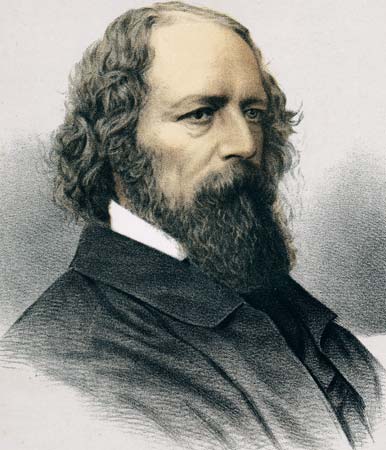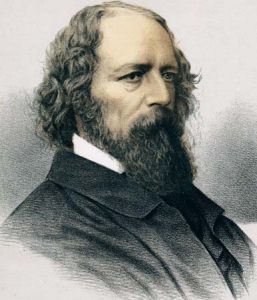The Poet Laureate is an honorary position appointed by the monarch on the advice of the Prime Minister. The role doesn’t have any specific duties, but there is an expectation that the holder will write verse for significant national occasions. The origins of the laureateship date back to 1616 when a pension was provided to Ben Jonson, but the first official holder of the position was John Dryden, appointed in 1668 by Charles II. Alfred Tennyson, First Baron Tennyson (1809-1892) was Poet Laureate during much of Victoria’s reign and remains one of the world’s most popular poets.
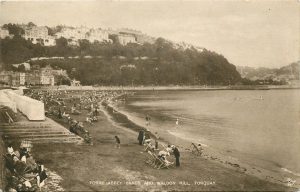
Alfred excelled at writing short lyrics, as in The Charge of the Light Brigade, and much of his poetry was based on classical or mythological themes, such as Ulysses or the life of Arthur.
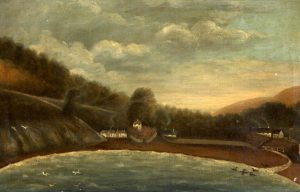
Some of his phrases have since become well known. They include “Nature, red in tooth and claw”, “‘Tis better to have loved and lost, Than never to have loved at all”, and, “Theirs not to reason why, Theirs but to do and die”. Tennyson is the ninth most frequently quoted in The Oxford Dictionary of Quotations.
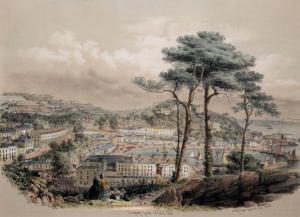
In 1838 Tennyson was in Torquay, a place he called “the loveliest sea village in England”. He apparently “had no money for touring, nor did he wish for change”. He wrote at the time, “I require quiet and myself to myself, more than any man when I write.”
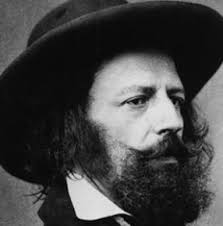
During this visit he wrote the poem Audley Court, which was published in the two volume Morte D’Arthur and Other Poems in 1842. The collection also includes The Lady of Shallot, The Lotus Eaters, Morte d’Arthur and Ulysses. This work established his reputation, receiving praise from Carlyle and Dickens.
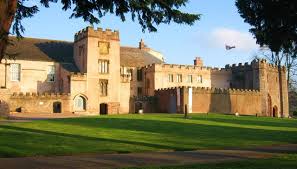
Tennyson told his son that Audley Court was partly inspired by Torre Abbey Park where it was written. The last lines described the scene from the hill overlooking The Bay – presumably Waldon Hill. He said he observed “a star of phosphorescence made by the buoy appearing and disappearing in the dark sea.”
On the death of Alfred, the post of Poet Laureate wasn’t filled for four years as a mark of respect.
Here’s Audley Court
“The Bull, the Fleece are crammed, and not a room
For love or money. Let us picnic there
At Audley Court.”
I spoke, while Audley feast
Hummed like a hive all round the narrow quay,
To Francis, with a basket on his arm,
To Francis just alighted from the boat,
And breathing of the sea. “With all my heart,”
Said Francis. Then we shouldered through the swarm,
And rounded by the stillness of the beach
To where the bay runs up its latest horn.
We left the dying ebb that faintly lipped
The flat red granite; so by many a sweep
Of meadow smooth from aftermath we reached
The griffin-guarded gates, and passed through all
The pillared dusk of sounding sycamores,
And crossed the garden to the gardener’s lodge,
With all its casements bedded, and its walls
And chimneys muffled in the leafy vine.
There, on a slope of orchard, Francis laid
A damask napkin wrought with horse and hound,
Brought out a dusky loaf that smelt of home,
And, half-cut-down, a pasty costly-made,
Where quail and pigeon, lark and leveret lay,
Like fossils of the rock, with golden yolks
Imbedded and injellied; last, with these,
A flask of cider from his father’s vats,
Prime, which I knew; and so we sat and ate
And talked old matters over; who was dead,
Who married, who was like to be, and how
The races went, and who would rent the hall:
Then touched upon the game, how scarce it was
This season; glancing thence, discussed the farm,
The four-field system, and the price of grain;
And struck upon the corn-laws, where we split,
And came again together on the king
With heated faces; till he laughed aloud;
And, while the blackbird on the pippin hung
To hear him, claplep his hand in mine and sang –
“Oh! who would fight and march and countermarch,
Be shot for sixpence in a battle-field,
And shovelled up into some bloddy trench
Where no one knows? but let me live my life.
“Oh! who would cast and balance at a desk,
Perched like a crow upon a three-legged stool,
Till all his juice is dried, and all his joints
Are full of chalk? but let me live my life.
“Who’d serve the state? for if I carved my name
Upon the cliffs that guard my native land,
I might as well have traced it in the sands;
The sea wastes all: but let me live my life.
“Oh! who would love? I wooed a woman once,
But she was sharper than an eastern wind,
And all my heart turned from her, as a thorn
Turns from the sea; but let me live my life.”
He sang his song, and I replied with mine:
I found it in a volume, all of songs,
Knocked down to me, when old Sir Robert’s pride,
His books -the more the pity, so I said –
Came to the hammer here in March -and this –
I set the words, and added names I knew.
“Sleep, Ellen Aubrey, sleep, and dream of me:
Sleep, Ellen, folded in thy sister’s arm,
And sleeping, haply dream her arm is mine.
“Sleep, Ellen, folded in Emilia’s arm;
Emilia, fairer than all else but thou,
For thou art fairer than all else that is.
“Sleep, breathing health and peace upon her breast:
Sleep, breathing love and trust against her lip:
I go tonight: I come tomorrow morn.
“I go, but I return: I would I were
The pilot of the darkness and the dream.
Sleep, Ellen Aubrey, love, and dream of me.
So sang we each to either, Francis Hale,
The farmer’s son, who lived across the bay,
My friend; and I , that having wherewithal,
And in the fallow leisure of my life
A rolling stone of here and everywhere,
Did what I would; but ere the night we rose
And sauntered home beneath a moon, that, just
In crescent, dimly rained about the leaf
Twilights of airy silver, till we reached
The limit of the hills; and as we sank
From rock to rock upon the glooming quay,
The town was hushed beneath us: lower down
The bay was oily calm; the harbour-buoy,
Sole star of phosphorescence in the calm,
With one green sparkle ever and anon
Dipped by itself, and we were glad at heart.
For more local news and info, go to our home page or you can join us over on Facebook or Twitter.


